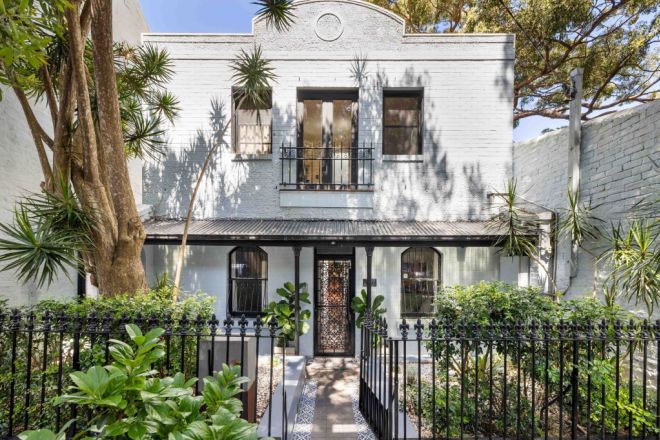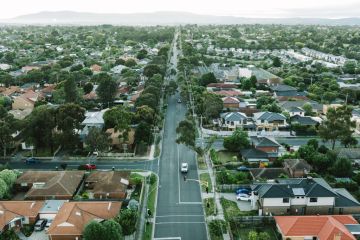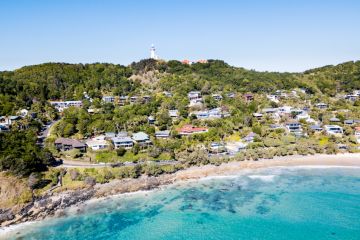The type of property where prices are falling most right now
Property price falls are steeper among the most expensive homes for sale than at the cheaper end of the market, new figures show.
Home values are falling as buyers feel the pinch of high interest rates that have reduced how much they can borrow, prompting them to search for more affordable properties instead.

CoreLogic analysis compares the most expensive 25 per cent of homes with the median value and the cheapest 25 per cent.
It found that the upper end of the market for Sydney houses has fallen 1.1 per cent in value over the three months to October, while the most affordable segment has risen 1.6 per cent.
Melbourne’s upper end houses fell 1.2 per cent in value over the same period, while the cheaper price bracket fell a more modest 0.6 per cent.
The figures arise as Sydney home values fell 0.1 per cent in October – the first rise in almost two years – while Melbourne lost another 0.2 per cent to be 1.9 per cent lower than a year ago.
Even in cities where the property market has been booming, price gains were more modest at the top end. Brisbane had a smaller rise for more expensive houses (up 1.9 per cent) than cheaper houses (3.2 per cent) and Perth followed suit (3.2 per cent at the top, 5.2 per cent for the lower end).
CoreLogic head of Australian research Eliza Owen said buyer demand has been dropping at the higher end of the market amid higher interest rates and elevated inflation.
“Affordability constraints set in at the high end first, so limited borrowing capacity, less money to put away for a deposit because of inflationary pressures,” she said.
“The reason you see relatively steady performance and the middle of the market and the lower end of the market is because more buyer demand skews to the low end in that kind of situation.
“Higher interest rates can create this greater market inequality because you’ve got buyers that would usually be competing for a greater breadth of properties are more zoned in on this middle to low-value stock.
“That means the higher income households are going to have a greater chance … Less of the housing market is available to lower income households.”
She thought the trend was unlikely to change until there is a shift in interest rates or change in economic conditions. Once a property upswing begins and purchasing power improves, the high end tends to outperform.
She said as buyers have dropped out of competing for higher-end homes, the biggest discounts have been in the markets where they are least needed.
“A cyclical downswing doesn’t do that much for greater homeownership or access to housing.”
BresicWhitney chief executive Thomas McGlynn said prices in his patch of inner Sydney had been coming back slightly for the past two months, while auction clearance rates have been sluggish.
“That’s got a lot to do with a flight to value and affordability and I do feel that we have seen since winter, we’ve seen a lot more people looking to consolidate debt and to also reduce debt. And generally when you’re doing that you are potentially looking to downsize.”
He said over the past couple of months buyers and sellers have become more used to the adjustment in pricing.

“Many sellers have identified there is more to choose from in the market right now and although they might get slightly less than what they anticipated selling, they are likely to pick that up on their next purchase,” he said.
But he added there was still a healthy amount of buyers, and most pass-ins received genuine bidding, while properties with great features are still relatively popular.
In Melbourne, Marshall White director John Bongiorno felt prices had been largely steady in the affluent inner suburbs, but said it was different for the Mornington Peninsula secondary home market.
“It’s been a pretty balanced market for most of the year for buyers and sellers. Where vendor expectations have been high, I think the market’s been sensible enough to resist paying silly numbers for properties, and it’s generally only when a property is aligned to the market, or price aligned to the market, that we’re seeing transactions take place,” he said.
“Properties that are turnkey properties have been a lot more sought after .”
There had been few runaway auctions, and many had been selling within the quoted price range, he said.
But he said it was different for homes that were overpriced, or the peninsula in general, which had been under pressure from an increase in state government land tax on second homes.
“Generally prices on the peninsula are down and they’re certainly off their highs,” he said.

We recommend
States
Capital Cities
Capital Cities - Rentals
Popular Areas
Allhomes
More







